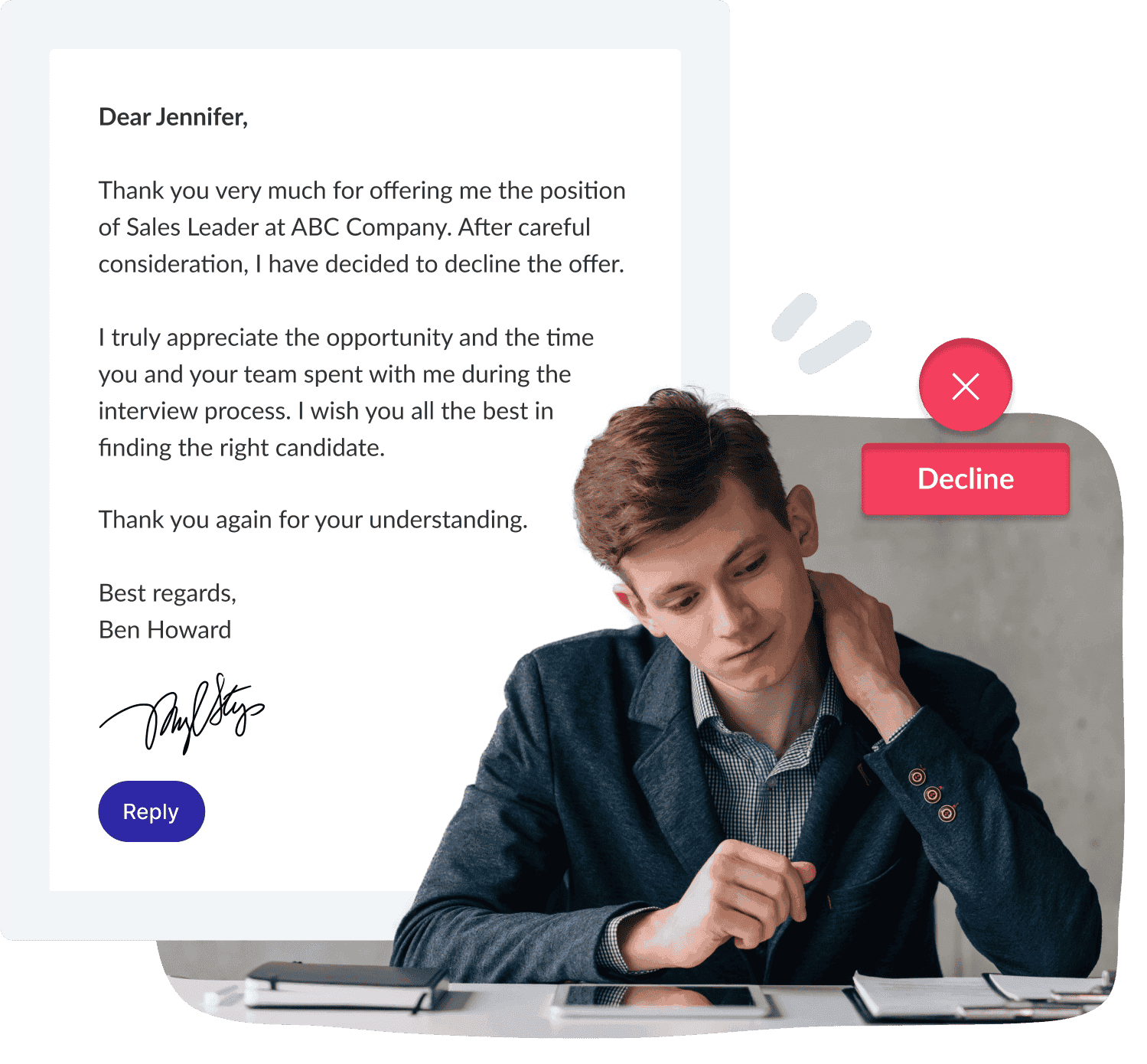
Land Your Dream Job With a Letter of Interest
How to create a captivating letter of interest. In our article we explore the benefits, common mistakes to avoid, and you get our ultimate guide customizable letter of interest template.

According to the U.S. Bureau of Labor Statistics, you have a 30% chance of getting a job offer when you apply for between 21 and 80 jobs. Even so, not every job offer you get will be one you want. Although it can be challening, it’s essential to understand how to reject a job offer without burning bridges between yourself and the company you’re rejecting. Regardless of why you’re choosing to reject the offer, maintaining a positive relationship may leave very important doors open for your future career path.
Rejecting a job offer is common, especially when labor markets favor employees. Notably, a Glassdoor report found that over 17% of people rejected job offers in 2019 (down from nearly 20% in 2010, but up from around 15% in 2015). What’s important here, however, is not so much the number of rejections but the reasons, which generally align one or more factors:
Since these are among the main reasons people quit jobs, it stands to reason that you’re likely to reject an offer if you see yourself quitting because of it (or because you quit a previous employer because of it). With that in mind, we’ll explore how to professionally decline a job offer in a way that identifies the reason you’re declining without completely hurting the potential for future engagement.

Payscale found that 42% of people believe they’re underpaid. If you receive a job offer with compensation and benefits that are too low, and the employer is unwilling to negotiate, here’s a rejection email template that may work for you:
Hi [Hiring Manager Name]:
Thank you so much for the job offer! I am truly grateful for the opportunity and your consideration. After careful thought, I have decided to pursue another position that more closely aligns with my current compensation and benefits needs.
I was very impressed with [Insert Company Name] and the vision you have for your company. If opportunities that better match my experience and compensation needs become available, I will welcome the chance to reconnect.
Thank you!
[Insert Your Name]
A negative experience in the hiring process may easily sour you on the role. If that happens, here is a template that may work for you:
Hi [Hiring Manger Name]:
Thank you so much for the job offer! I sincerely appreciate the time and effort you and your team have invested in the interview process. After thoughtful consideration, I feel that pursuing other opportunities is the best decision for me at this time.
It was a pleasure learning about [Insert Company Name]. Should circumstances align in the future, I would be happy to explore potential opportunities together.
Thank you!
[Insert Your Name]
Many companies are taking longer to hire people. The human capital advisory firm Josh Bersin found that companies take an average of 44 days to hire, with some roles sitting empty for 2 to 3 months. If you had been on the receiving end of a slow hiring process, you might have taken another offer that came in (even if it was a less desirable one).
Here is a template that may work for you in this situation:
Hi [Hiring Manager Name]:
Thank you so much for the job offer! I’m honored that you found value in my experience, skills, and ability to contribute to [Insert Company Name]. I greatly enjoyed getting to know everyone and learning about the role and company values. Unfortunately, due to timing considerations, I have already accepted another job offer that also aligns with my career goals.
Please know that I hold your team in high regard and would be very interested in exploring future opportunities at [Insert Company Name] should they arise. Please feel free to stay in touch.
Thank you!
[Inser Your Name]
Pew Research found that during the Great Resignation, 63% of people who quit cited “no opportunities for advancement” as a key reason for leaving their jobs. If the role you were offered is at a company that does not appear to support your development goals, it might be a good idea to pass on that role instead of finding yourself in an early turnover situation.
Here is a template that may work for you in this situation:
Hi [Hiring Manager Name]:
Thank you so much for the job offer! I truly appreciate being offered the opportunity to join your team. After reflecting on my career goals, I have decided to pursue a role that offers more opportunities for personal growth and skill development.
I was impressed by [Insert Company Names]’s mission and would welcome the chance to explore future roles that might be a better fit. Please don’t hesitate to reach out if such opportunities become available.
Thank you!
[Insert Your Name]
A YouGov survey found work-life balance is incredibly important to nearly 70% of US workers. That’s the kind of data that should comfort you if you ultimately reject a job offer for a role that looks like it may not offer the kind of work-life balance that you want or need.
Here is a template that may work for you in this situation:
Hi [Hiring Manager Name]:
Thank you so much for the job offer! I’m thankful that you found value in my experience and skills. I was impressed by your teams significant dedication to their work and the mission of the company. After careful consideration, I have decided to pursue a position that better aligns with my work-life balance preferences, including options like remote or hybrid work.
I respect the work being done at [Insert Company Name] and would be interested in future opportunities that offer greater flexibility. Please feel free to contact me if such roles become available.
Thank you!
[Insert Your Name]
You may feel anxiety over rejecting a job offer, particularly in a difficult labor market where jobs are hard to come by. This is going to be less of an issue if you are sitting on multiple job offers, but it may cause a high level of anxiety if you find yourself rejecting the only job offer you receive after sending dozens of applications.
One thing to keep in mind is that rejecting job offers is very common. A Garner survey conducted in May 2023 (notably, a period where the job market was a bit more in favor of employees) found that:
of people accepted a job offer, then backed out of it
of people who received job offers were still open to other offers after they’d already accepted one
thought they could find a better job offer if they kept looking
While you can accept a job offer and then back out of it if a better offer comes in before you start, this practice is deeply frowned upon and likely to sour your future prospects with those employers and the recruiters or recruiting companies they hire to find talent.

Depending on the reason why you’re rejecting the job offer, sending that “no thanks” email response could either make you feel bad or empowered. For example, if you had a terrible experience in the interview process, you might be tempted to send an overtly snarky rejection email. As with many things, it might make you happy at the time, but it could also hurt your future job prospects.
This is where the concept of “don’t burn bridges” comes in. Your view into each recruiter’s or hiring team’s network could be fairly limited. In many cases, the recruiter may be working for a company that recruits for multiple businesses. When recruiters find a great candidate, even if that candidate rejects the job offer, they often return to that candidate for future roles.
Recruiters and hiring managers are people, and whether they do so consciously or not, they may hold onto negative experiences with candidates in a way that could hurt you in the future when applying to jobs at the same or other companies.
However, if your rejection letter is negative, you may find yourself silently blacklisted by that recruiter. Is that an acceptable or official policy? Not typically? Does it happen? Unfortunately yes. As Joann Lublin explained in a Wall Street Journal article, black marks can derail your job search.
If you’ve rejected a job offer for reasons that weren’t due to negative experiences (such as having a better offer or having the offer come in too late), it might be prudent to stay in touch with the recruiter and hiring managers.
Add the individuals you interviewed with to your LinkedIn network. Stay engaged with them by commenting and reacting when they post content. Follow the company’s social media pages so you can stay up-to-date on what’s happening there. If the company makes a major announcement that’s directly related to the team you were supposed to work with, send congratulations to the individuals you spoke to on the hiring team.
Doing this will help you continue the relationships you started during the interview process and help keep you as a top-of-mind candidate should new roles arise that fit your skills and interests.
If the employer thought you were a good candidate when they offered you a job, and you were cordial in the rejection letter, there’s very little reason for them to change their mind about your value as a potential employee. If anything, gaining more experience somewhere else in the interim will likely make you more appealing as a hire.
Regardless of why you need to turn down a job offer, you may still have future job prospects with that company. The individuals who made your interview experience negative may leave and be replaced by others who are a better culture fit. The company may grow in size and be able to offer a better compensation package. The company leaders may reverse course on their return-to-office policy and instead embrace remote and hybrid work.
Companies are dynamic and, just like you, they change over time. Those changes may mean future opportunities to work together. Make sure your rejection letters leave those doors open so that you keep all of your options open as you develop in your career.

To decline a job offer politely, send a response to the hiring manager that starts by thanking them for their interest in you and for the opportunity to interview with them. Then, provide a brief but cordial decline of the offer. You do not need to provide extra details on why. Avoid making any negative commentary on why you are declining the offer, as it’s strategically important to leave the door open for potential relationships down the road.
The best way to decline a job offer without offending is by focusing on the positive aspects of the interview process. Once you have covered those details very briefly in your email or letter, let the hiring manager know that you made a decision not based on anything specifically negative about the company. For example, if you received a different and better offer, you might say “I decided to accept an offer that aligned more closely with my personal and professional goals.” Most hiring managers will understand why you declined an offer, even if you don’t say so directly, and they are not likely to take offense.
However, some may ask follow-up questions to refine their hiring process. Decide how much you want to say, but make sure you say it in a way that leads with kindness.
To turn down a job offer without burning bridges, avoid saying anything overtly negative about the company, the hiring manager, or the hiring team that interviewed you. Instead, thank them for their time and let them know that while you decided to go with a different offer, you would be happy to explore more opportunities with the company in the future.
Modernize your hiring process with expert insights and advice.